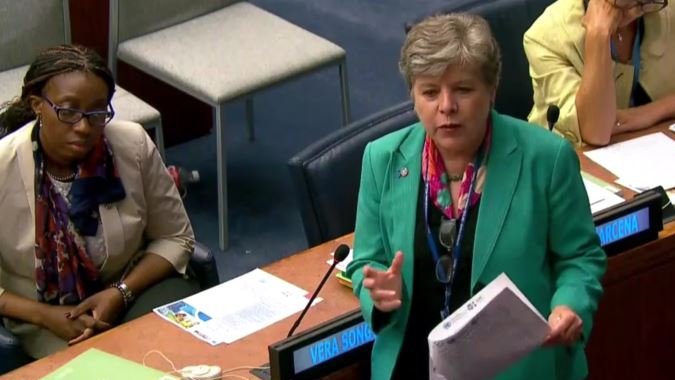Technology and Innovation are Fundamental for the Implementation of the 2030 Agenda in Latin America and the Caribbean
Alicia Bárcena, ECLAC’s Executive Secretary, participated in New York in a High-Level Roundtable where she highlighted the importance of creating new digital ecosystems that allow for revamping educational models and reducing gaps.

Technology and innovation are crucial means for implementing the 2030 Agenda and the Addis Ababa Action Agenda, and their advances show great promise for eradicating poverty and promoting sustainable development, Alicia Bárcena, the Executive Secretary of the Economic Commission for Latin America and the Caribbean (ECLAC), said during a High-Level Roundtable organized by Egypt, in its role as President of the G77, and the United Nations Regional Economic Commissions.
The side event “Technology and Innovation for Sustainable Development: Regional experiences to promote youth employment and address inequality,” held in the framework of the High-level Political Forum (HLPF) taking place at United Nations headquarters in New York, was moderated by Alicia Bárcena, who gave a regional perspective on the progress and challenges of new technologies in Latin America and the Caribbean.
The speakers at the event included Ambassador Mohamed Fathi Ahmed Edrees, the Permanent Representative of Egypt to the United Nations; Hala Al Saeed, Egypt’s Minister of Planning, Follow-up and Administrative Reform; and Rodrigo Malmierca, Cuba’s Minister of Foreign Trade and Foreign Investment.
Other participants were Vera Songwe, Executive Secretary of the Economic Commission for Africa (ECA); Mohamed Ali Alhakim, Executive Secretary of the Economic and Social Commission for Western Asia (ESCWA); Olga Algayerova, Executive Secretary of the United Nations Economic Commission for Europe (UNECE); and Kaveh Zahedi, Deputy Executive Secretary of the Economic and Social Commission for Asia and the Pacific (ESCAP).
During her remarks, Alicia Bárcena indicated that accelerated technological change and digital disruptions are destined to play a very important role in the achievement of the Sustainable Development Goals.
She added that advances in the areas of genetics, robotics, renewable energy, artificial intelligence and other technologies, show great promise for eradicating poverty and promoting sustainable development.
“They represent an opportunity, but only if our societies, if our educational systems and the way in which we forge a new social compact between governments, the private sector, academia and young people, change the paradigm through which we address technological problems,” Bárcena affirmed.
The senior United Nations official said that in Latin America and the Caribbean, Internet use reaches 60% of the population that is mostly young. However, there continue to be gaps between urban and rural areas, and significant gender gaps that, along with others, limit women’s access to scientific careers.
“We need to make faster progress on educational matters, but let’s think about what type of education we need. We must think about whether our educational systems are ready for the challenges of the future,” she stated.
Bárcena added that new digital ecosystems must be created that allow for revamping educational models and reducing gaps in access, application and gender equality with regard to the use of new technologies and the future of work.
“We need to help young people understand new technologies, because many of the jobs that exist today will not exist in the future. We are preparing people for jobs that will not exist. Sixty-five percent of the children entering primary school will have jobs that do not exist today,” she indicated.
Alicia Bárcena also highlighted the Digital Agenda eLAC 2020, a regional tool that seeks via cooperation to continue making progress on inclusion, the digitalization of production, the development of capacities in the population, and on promoting open government and a governance that stimulates collaboration among countries.
In his remarks, Mohamed Fathi Ahmed Edrees said that during its presidency of the G77, Egypt has established border issues as its priority. He emphasized that it is crucial to develop an analysis of the impact of border problems on equality and to take advantage of their potential to create employment.
Meanwhile, Minister Rodrigo Malmierca stressed that the transformation of technology has a great impact on young people but said progress is limited due to polarization and low levels of education.
He also indicated that ECLAC’s analyses help the countries of Latin America and the Caribbean evaluate the effects of Information and Communications Technologies (ICTs) for designing public policy.
Earlier in the day, ECLAC’s Executive Secretary participated in an event organized by the government of Argentina, where she stressed that the achievement of the 2030 Agenda for Sustainable Development and its goals (SDGs) requires the impetus of regional cooperation among Latin American and Caribbean countries.
Other participants in the event “The 2030 Agenda under the Argentine presidency of G-20: Peer learning mechanisms, the importance of regional cooperation and approach in the medium term” included Achim Steiner, Administrator of the United Nations Development Program (UNDP), and Gabriela Agosto, the Executive Secretary of Argentina’s National Council for the Coordination of Social Policies.
Also present were Ambassador Martín García Moritán, the Permanent Representative of Argentina to the United Nations; Ambassador Milenko Skoknic, the Permanent Representative of Chile to the United Nations; Ambassador Agustín García-López, Director of the Mexican Agency for International Development Cooperation (AMEXCID); and René Mauricio Valdés, UNDP’s Representative in Argentina, among other prominent figures.
In her presentation, Alicia Bárcena emphasized two priorities for advancing toward the achievement of the 2030 Agenda in the region: bolstering countries’ financial security networks by strengthening the provision of counter-cyclical financing to face external shocks and mobilizing resources for development, while also promoting intraregional trade as a fundamental step toward integration; and promoting development banks, in their role as providers of financing for projects related to infrastructure, production, social development and mitigation in light of climate change.
Country(ies)
- Latin America and the Caribbean
Contact
Public Information Unit
- prensa@cepal.org
- (56 2) 2210 2040
